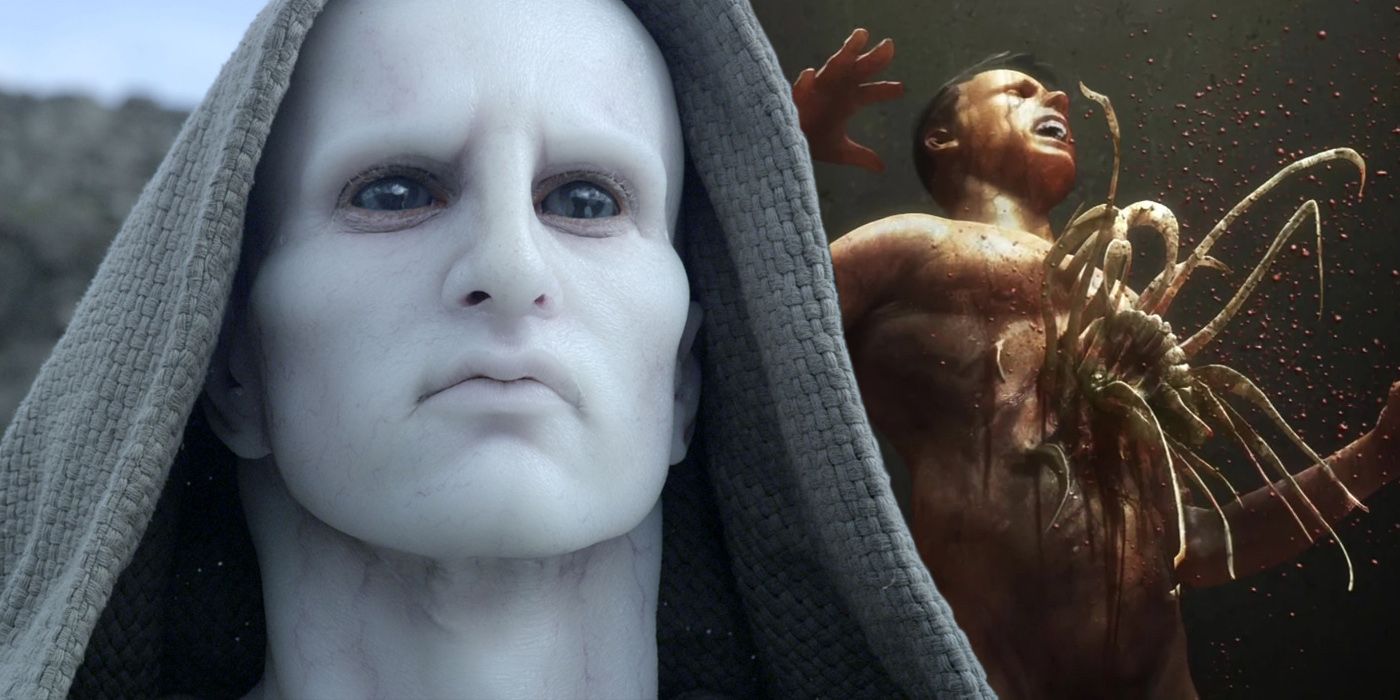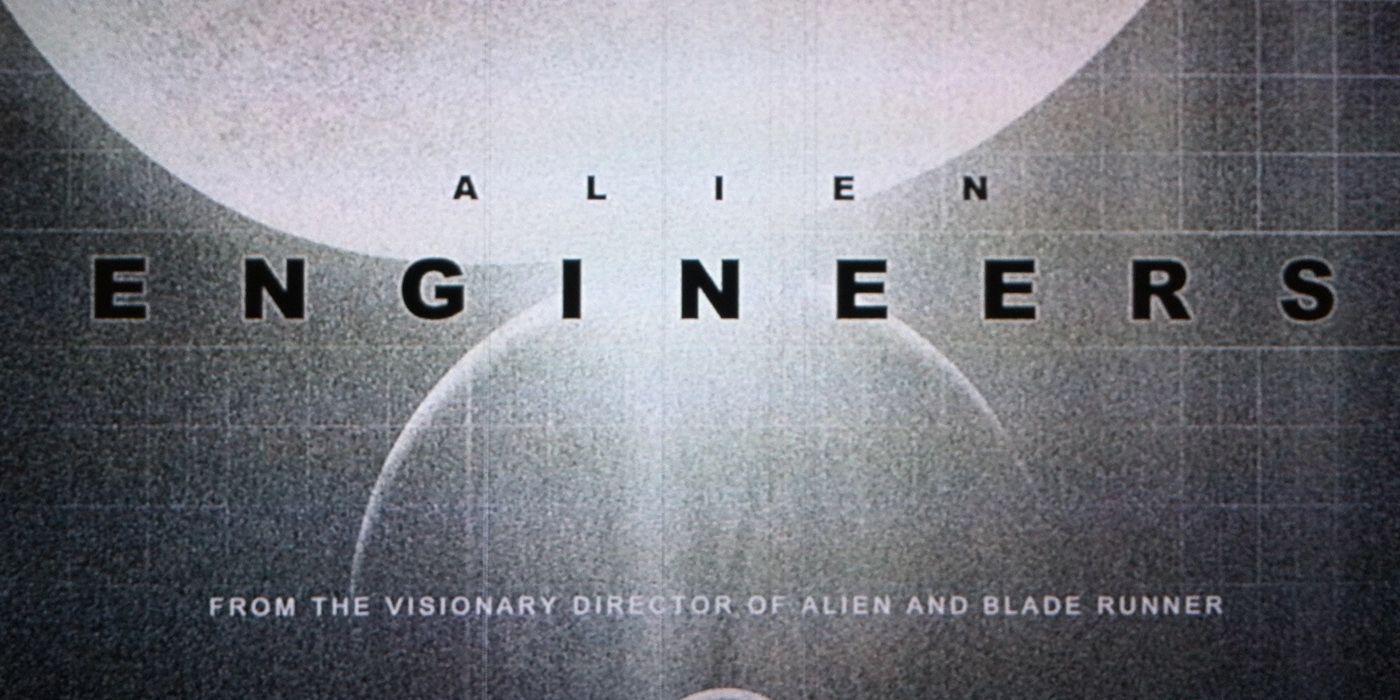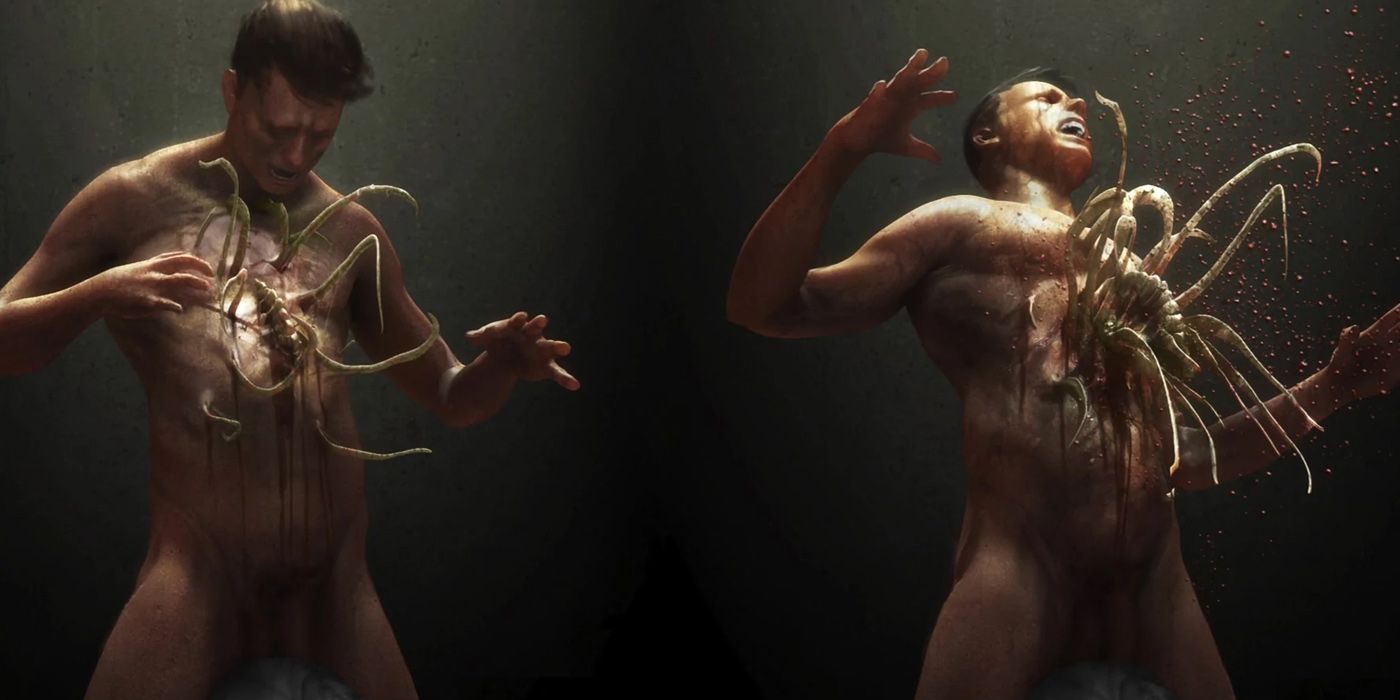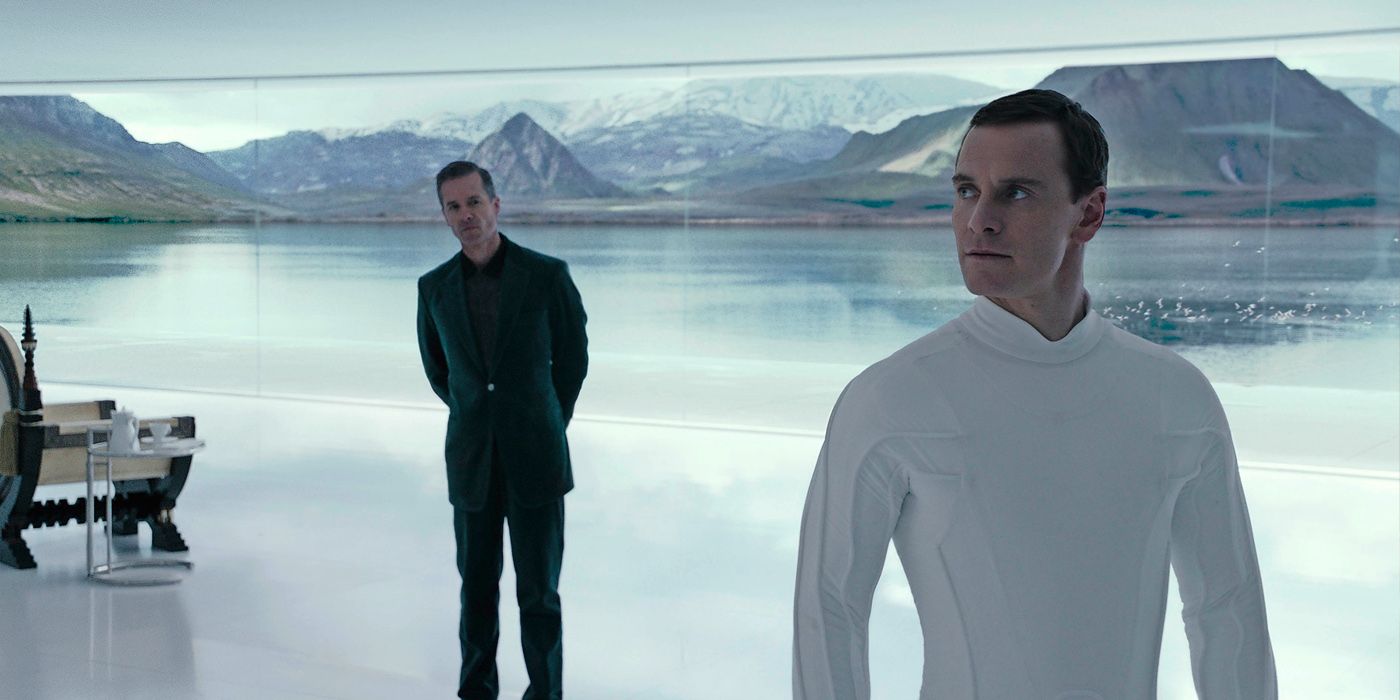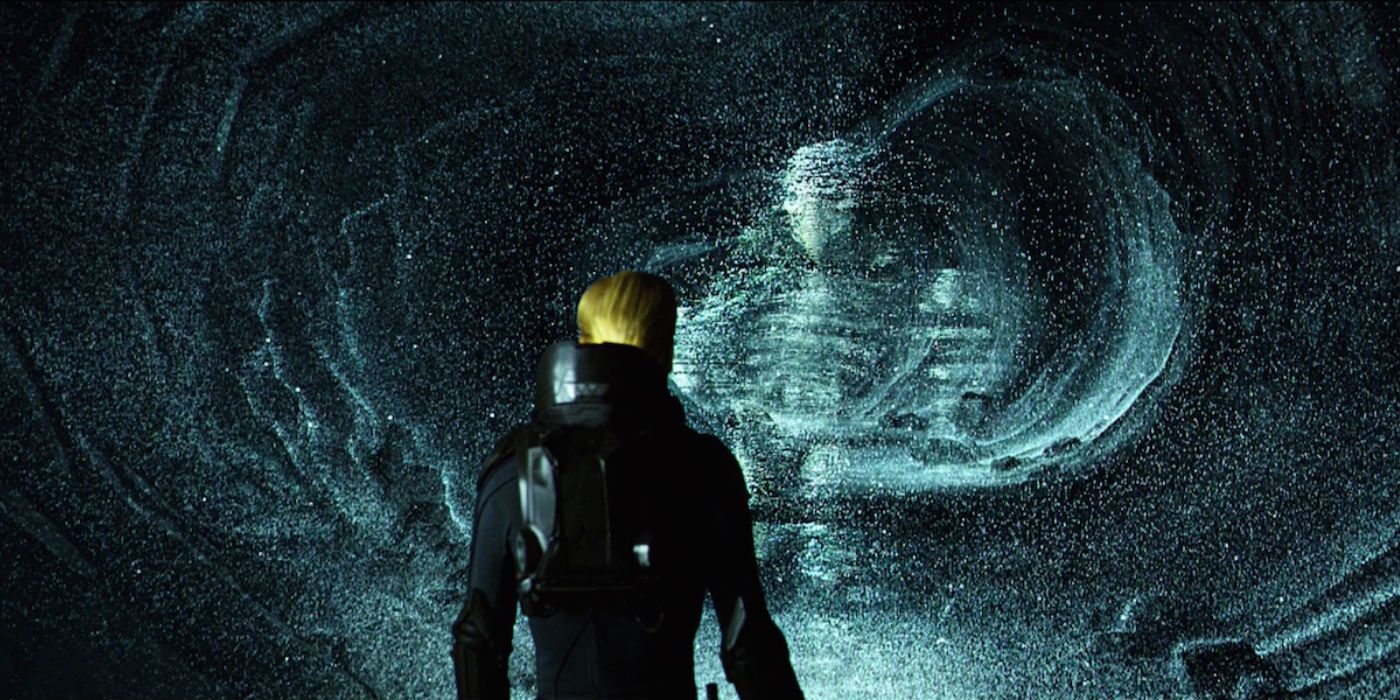The original script for Ridley Scott's Alien prequel sheds some interesting light on both Prometheus and Alien: Covenant. There's been serious talk of an Alien reboot set before the original film for the better part of a decade, with Ridley Scott signing on for the project back in 2009 after years of teasing an exploration of the xenomorph's origin. This has ultimately come to the screen with Prometheus and now Covenant, but the creation-minded series could have been very different had the original idea been used.
The kernel of the enterprise is a script by Passengers scribe Jon Spaihts titled Alien: Engineers. Commissioned around the same time Scott came on board, it would have taken the series in a more direct, series-faithful journey to the 1979 original. Like Spaihts' Black Listed screenplay, however, a lot of changes were made between him handing in the draft and the movie entering theaters. Damon Lindelof, best known for Lost, took Engineers and injected some of J.J. Abrams' mystery box ethos, leading to a more high-minded script with serious distance from the original Alien.
Based on what we've seen in Covenant, the events depicted in that draft are 100% non-canon, but there's still immense worth in the screenplay. Indeed, the story behind Engineers provides an explanation for why Prometheus and Covenant are the philosophical genre movies they are, and may even provide clues for where the series could be heading.
What Happened In Alien: Engineers?
At its core, Engineers follows a similar plot to Prometheus, just with a more explicit Alien connection. A group of scientists (led by Jocelyn Watts and Professor Martin Holloway) find evidence of humanity's creators on Earth, meet with Peter Weyland and travel off in search of their creators on a ship called the Magellan. Their destination is LV-426, the moon in the original Alien. There they detect several structures that are clearly the product of living beings and go to investigate, finding terraforming equipment and a collection of dead Engineers inside.
From here the film branches into several subplots: Watts takes one of the creatures' heads and experiments on it, revealing the Space Jockey helmet as a mask; two of the group - Fifield and Millburn - are left in the structure and attacked by crawling, bug-like beings; company woman Vickers gets a group of mercs to collect the alien tech. Most importantly, Holloway is separated and impregnated with an alien, leading to what would have been the movie's show-stopper; later reuniting with Watts, they have sex and the creature - a proto-xenomorph - bursts out of his chest.
Watts goes back to the structure to figure out what happened, coming across the mission's android David who has uncovered an Engineer spacecraft. The ship was set to target Earth and wipe out humanity with a slew of facehuggers before the creatures got loose. Deciding to continue their work, David unleashes a facehugger on Watts and activates the ship. She has the alien removed from her by a surgical pod (meaning there's two aliens - hers and Holloway's - on the ship).
The survivors set out to stop David, who has now woken an Engineer from cryosleep. The behemoth decapitates David and kills most of the Magellan crew, while a mutated Fifield finishes off Vickers and the mercenary leader. The Engineer then speeds off, only to be killed by a chestburster implanted before his hypersleep. In the confusion the Magellan is able to crash into the craft, sending it plummeting to the ground below ready and waiting for the Nostromo crew of the original film. Watts escapes the crash, takes on the "Ultramorph" birthed from the Engineer and is left alone on the planet with David as a warning beacon begins transmitting.
Next Page: [valnet-url-page page=2 paginated=0 text='Alien%3A%20Engineers%20Changes%20Explained']
The Big Differences Between Engineers and Prometheus
While the broader plot strokes are the same as Prometheus, what should be immediately apparent with Engineers is how it ends directly connected to Alien - we learn the alien was a biological weapon and the ship crash at the end is the origin of the derelict from the original film, leaving little ambiguity.
Further, Engineers would have also been closer to its predecessor tonally, with a more overt horror element - there's three different xenomorphs running about and several dangerous aliens besides - that promised greater terror and bloodshed. In that regard, more time is invested in establishing the participants; most of the same characters appear in both stories (albeit sometimes under different names, like how Noomi Rapace's Shaw is Watts) but the back and forth between scientists and workers is much more evocative of the original's endless discussion of shares rather than Prometheus' eventual leaden dialogue, making most key players more likable (and thus their deaths more impactful).
There's also hints of company deviousness. This was an essential part of all four original Alien movies, with Weyland-Yutani habitually putting preserving xenomorph samples over the life of its employees, making them more dangerous than the alien in some cases (the plot of Alien and Aliens is explicitly caused by company meddling). Here Weyland's deal with Watts and Holloway is so he can explicitly secure any alien tech, whereas both Prometheus and Covenant have put this on the backburner in favor of its more religious themes; finished movie Weyland is more concerned with immortality, something that subtly but resolutely creates more Alien distance.
The biggest differences come in the fundamental backstory. For starters there's the Engineer's alternate involvement in the creation of humanity; while the finished Prometheus essentially debunks Darwinism, in Engineers it's alluded that they simply accelerated evolution a la the monoliths in 2001: A Space Odyessy, with the opening sequence having one of the giants sacrificing himself while a primitive human watches. The screenplay also offers a specific xenomorph origin (they were made by Engineers), which was absent from Prometheus and has since been reworked in Covenant to have them the product of David's idle experimentation.
Altogether the Lindelof rewrite makes things much vaguer and more distanced - we go to a different planet on an adventure that is only tangentially linked to the original movie. However, there's a bigger shift occurring between Engineers and Prometheus. Whereas to Spaihts the creation element is simply a means to get to the Alien terror, it clearly captivated Scott to the point where he wanted to reframe the entire movie to be about that, with the franchise connection now the background interest.
Perhaps the most interesting aspect of Engineers from a current standpoint, though, is the elements that were held back for Covenant (and potentially later). Most prominently is David as the villain; the original draft immediately jumps to the synthetic inheriting humanity's creator's plans and becoming an architect of our destruction, something that has only just emerged with the latest film. It shows Fassbender was always intended as a major threat but also hints that Scott's still pulling elements from that early script. Where the series is heading is unclear, but it's possible some of the many interesting creatures - such as the Engineer-produced "Ultramorph" - or the specifics of the derelict crash will be realized on screen eventually.
Was Engineers Better?
And now for the ultimate question that any discussion of Alien: Engineers comes down to - is it better than Prometheus and Covenant? And, like any discussion of these films, it's trickier than a simple one-word answer. Yes, Engineers is a better single story - everything makes immediate sense, the characters are intriguing and it directly connects into Alien. It's not bold to say that, had Scott used this as the roadmap, his 2012 movie would likely have been much more positively received.
However, the director's now instigated something grander than a simple reboot-cum-explainer. In light of Covenant, it's clear that Prometheus was just the start of a journey exploring heavy themes of existentialism and creation, something that is far more interesting that a one-and-done answer. Engineers was just a prequel; what we ultimately got is a more complex, higher-reaching vision that, while not fully achieving all it aims for, provides something unique in modern blockbusters.

